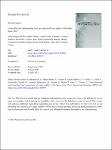Unravelling and understanding local perceptions of water quality in the Santa basin, Peru
| dc.contributor.author | Rangecroft, S | |
| dc.contributor.author | Maria Dextre, R | |
| dc.contributor.author | Richter, I | |
| dc.contributor.author | Grados Bueno, CV | |
| dc.contributor.author | Kelly, C | |
| dc.contributor.author | Turin, C | |
| dc.contributor.author | Fuentealba Durand, B | |
| dc.contributor.author | Camacho Hernandez, M | |
| dc.contributor.author | Morera, S | |
| dc.contributor.author | Martin, John | |
| dc.contributor.author | Guy, A | |
| dc.contributor.author | Clason, C | |
| dc.date.accessioned | 2023-08-01T10:13:50Z | |
| dc.date.available | 2023-08-01T10:13:50Z | |
| dc.date.issued | 2023-07 | |
| dc.identifier.issn | 0022-1694 | |
| dc.identifier.issn | 1879-2707 | |
| dc.identifier.other | 129949 | |
| dc.identifier.uri | https://pearl.plymouth.ac.uk/handle/10026.1/21115 | |
| dc.description.abstract |
Water quality is an integral part of water security. Measuring the physico-chemical indicators for water quality can provide an objective picture of water health, but it does not provide information on lived experiences related to water quality, expectations of water resources, nor how the quality of water affects its usage. Perceptual information and traditional ecological knowledge on water quality can help to understand interactions between water and people, and thereby support locally appropriate sustainable water resource strategies. Accordingly, our project sought to collect and synthesise insights from local perspectives on water quality in the upper Santa River basin, Peru, a region where water quality directly relates to people’s livelihoods. Perceptual data was collected via the Nuestro Rio mobile app (N = 149) as well as walking interviews (n = 84) (July-August 2021) in two main study areas, Olleros and Catac. We find that water quality perspectives differ within, and between, study areas and communities, however four overarching themes were identified, and are explored here: i) environmental indicators for water quality; ii) water uses; and iii) perceived causes of water quality; iv) water quality perceptions behind emotions. Most rural participants felt the main cause of poor water quality was mineral pollution, likely linked to local geology, however we also found that local perceptions of water quality depend on water usage, directly linked to domestic water use and agricultural livelihoods. Qualitative data highlighted the complex relationships between water quality, perceptions and emotions. More inclusive citizen-based science that considers what people observe, think and feel about the quality of their rivers can help provide a much deeper contextual understanding of dynamic human-water systems, with further benefits for improving water management and policy implementation. | |
| dc.format.extent | 129949-129949 | |
| dc.language | en | |
| dc.publisher | Elsevier BV | |
| dc.subject | Water quality | |
| dc.subject | Perceptions | |
| dc.subject | Local communities | |
| dc.subject | Citizen science | |
| dc.subject | Interdisciplinary | |
| dc.subject | Peru | |
| dc.title | Unravelling and understanding local perceptions of water quality in the Santa basin, Peru | |
| dc.type | journal-article | |
| dc.type | Journal Article | |
| plymouth.author-url | https://www.webofscience.com/api/gateway?GWVersion=2&SrcApp=PARTNER_APP&SrcAuth=LinksAMR&KeyUT=WOS:001053141200001&DestLinkType=FullRecord&DestApp=ALL_WOS&UsrCustomerID=11bb513d99f797142bcfeffcc58ea008 | |
| plymouth.volume | 625 | |
| plymouth.publication-status | Published | |
| plymouth.journal | Journal of Hydrology | |
| dc.identifier.doi | 10.1016/j.jhydrol.2023.129949 | |
| plymouth.organisational-group | |Plymouth | |
| plymouth.organisational-group | |Plymouth|Research Groups | |
| plymouth.organisational-group | |Plymouth|PS - Research & Innovation | |
| plymouth.organisational-group | |Plymouth|Research Groups|Centre for Research in Environment and Society (CeRES) | |
| plymouth.organisational-group | |Plymouth|Faculty of Science and Engineering | |
| plymouth.organisational-group | |Plymouth|Faculty of Science and Engineering|School of Geography, Earth and Environmental Sciences | |
| plymouth.organisational-group | |Plymouth|Research Groups|Centre for Research in Environment and Society (CeRES)|CeRES (Reporting) | |
| plymouth.organisational-group | |Plymouth|REF 2021 Researchers by UoA | |
| plymouth.organisational-group | |Plymouth|Users by role | |
| plymouth.organisational-group | |Plymouth|Users by role|Academics | |
| plymouth.organisational-group | |Plymouth|REF 2021 Researchers by UoA|UoA03 Allied Health Professions, Dentistry, Nursing and Pharmacy | |
| plymouth.organisational-group | |Plymouth|REF 2021 Researchers by UoA|UoA13 Architecture, Built Environment and Planning | |
| plymouth.organisational-group | |Plymouth|Admin Group - R&I | |
| dcterms.dateAccepted | 2023-07-10 | |
| dc.date.updated | 2023-08-01T10:13:34Z | |
| dc.rights.embargodate | 2023-8-2 | |
| dc.identifier.eissn | 1879-2707 | |
| dc.rights.embargoperiod | forever | |
| rioxxterms.versionofrecord | 10.1016/j.jhydrol.2023.129949 |


